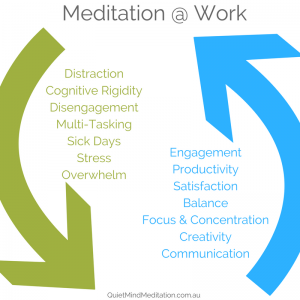“Modern office life and an increasingly common condition called ‘Attention Deficit Trait’ are turning steady workers into frenzied underachievers”
Dr Edward Hallowell, Harvard Business Review
What is the major challenge for workers today?
Attention!
Information overload, distraction and ‘sensory noise’ close down our ability to focus, think clearly and strategically, and effectively make decisions and drive teams. Research shows that our attention, at work and at home, is now under constant siege from data overload .. the 24/7 avalanche of information that we happily carry around in our pocket, and which feeds a consistent urgency to multitask and juggle, only further compromising our attention by outstripping our mental bandwidth.
Attention Deficit Trait (ADT) was identified by Massachusetts psychiatrist Edward Hallowell, who says it mimic’s the conditions of Attention Deficit Disorder, a neurological disorder that is mostly thought to be genetic, although ADT is actually a by-product exclusively of environment.
#1 too many interruptions
#2 excessive data overwhelming brain neurons
“the core symptoms are distractibility, inner frenzy, and impatience. People with ADT have difficulty staying organized, setting priorities, and managing time”
As studies from the University of Michigan and University of Vanderbilt have proven, we can’t do two or more high cognitive tasks at one time.
While we may think we are being super productive handling a sales call, while reading an email and preparing for a meeting; we are in fact demanding our brain to constantly switch and transition between tasks. When we switch from our first task, our brain turns off the cognitive rules for that task, and turns on the rules for the new one – this takes time and tends to trigger an increasing sense of urgency and disconnection .. leading to missed cues and on-the-fly emotional decisions.
How Can Meditation Help?
I have been there! For many years I worked in a dynamic and competitive corporate environment that caused me to constantly struggle with time demands, resource pressures, shifting targets and financial responsibility. However, I had a tool that gave me a much greater sense of balance and calm – I had a 20+ year meditation practice.
Our most powerful tool for handling stress and training the mind .. is Meditation.
#1 Increased Attention. One of the best ways to combat attention deficit is to improve our ability to concentrate; and the key is to learn how to focus. Buddhist monks have in studies been shown to have the best powers of attention due to intensive meditation practice.
Meditation is a discipline that involves turning the mind and attention inward and focusing on a single thought, image, object or feeling.
Definitions vary depending on the form you are practising; however, most forms involve training your mind to pay attention.
#2 Positive Brain Changes. Along with the many physical health benefits of meditation including less inflammation, pain management and lower blood pressure .. a regular meditation practice has also been shown to improve areas of the brain associated with higher order thinking (the prefrontal cortex). Think: awareness, concentration and decision-making. A stressed brain secretes hormones like cortisol and adrenaline in order to handle a perceived emergency, so our attention narrows in order to focus on the cause of the stress (rather than on the task(s) at hand) and our executive centre goes offline ie. goodbye attention, comprehension and learning.
#3 Stress is Contagious. When our team see us under stress, they are likely to experience an empathic response, and are far more likely to mirror negative attitudes. A 2000 study at the University of Michigan found that people in meetings together ended up sharing moods, good and bad, within two hours. Taking charge of our emotions (self-regulation) and proactively managing our stress before it starts to influence others .. is possible when we have a mindful meditation practice.
#4 Communication Gains. Being able to effectively communicate with others, truly listening and being aware of the meta messages inherent in any interpersonal exchange – supports us in effectively engaging and adapting our message for the best result.
Corporate Meditation Programs
When I take meditation into the corporate work environment, I focus on two important parallel meditation practices:
Meditative Exercises: simple, practical and immediately beneficial mindfulness exercises that are perfect for those moments when you find yourself ‘in the firing line’. These exercises rapidly reduce stress and overwhelm. Perfect for the office!
Formal Seated Meditation: a regular seated meditation is similar to practicing your golfing putt or playing piano scales .. it is a training, and with repetition we cultivate and strengthen our ability to focus. Research has consistently shown that a regular meditation practice is where the gold medal health benefits are .. we develop focus through consistent practice so we can stop skimming the surface of life experience, understanding what is our present moment reality and what response is called for.
From William George, Harvard Business School professor and former CEO of Medtronic:
“The main business case for meditation is that if you’re fully present on the job, you will be more effective as a leader .. You will make better decisions”
And that is an excellent ROI for any leader or business.
*If you are interested in introducing meditation and mindfulness to your team or organisation, contact sarah@quietmind.com.au or download our Meditation @ Work brochure here


